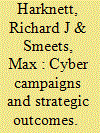| Srl | Item |
| 1 |
ID:
186097


|
|
|
|
|
| Summary/Abstract |
While much focus has remained on the concept of cyberwar, what we have been observing in actual cyber behaviour are campaigns comprised of linked cyber operations, with the specific objective of achieving strategic outcomes without the need of armed attack. These campaigns are not simply transitory clever tactics, but strategic in intent. This article examines strategic cyber competition and reveals how the adoption of a different construct can pivot both explanation and policy prescription. Strategy must be unshackled from the presumption that it deals only with the realm of coercion, militarised crisis, and war in cyberspace.
|
|
|
|
|
|
|
|
|
|
|
|
|
|
|
|
| 2 |
ID:
155276


|
|
|
|
|
| Summary/Abstract |
U.S. national cybersecurity strategy, to be effective must align with the structural features and operational characteristics of the domain. Yet, this article contends that the current U.S. strategy of deterrence, coupled with the establishment of norms in cyberspace, does not satisfy this requirement. Alternatively, a strategy of cyber persistence is proposed, one that is enabled rather than crippled by the uniqueness of cyberspace. In an environment of constant contact, a strategy grounded in persistent engagement is more appropriate than one of operational restraint and reaction for shaping the parameters of acceptable behavior and sustaining and advancing U.S. national interests.
|
|
|
|
|
|
|
|
|
|
|
|
|
|
|
|
| 3 |
ID:
117450


|
|
|
|
|
| Publication |
2012.
|
| Summary/Abstract |
Structural theories have advanced our understanding of International Relations (IR). This article contends that the two leading structural realist frameworks, however, rely too heavily on an ascribed unit motivation and core dynamic that are not derived from structure. This ultimately weakens both theories' explanatory potential. This article offers a refinement called structural autonomy that explains IR through a focus on a self-reliant pursuit of autonomy and the particular distribution of capabilities found across the system.
|
|
|
|
|
|
|
|
|
|
|
|
|
|
|
|